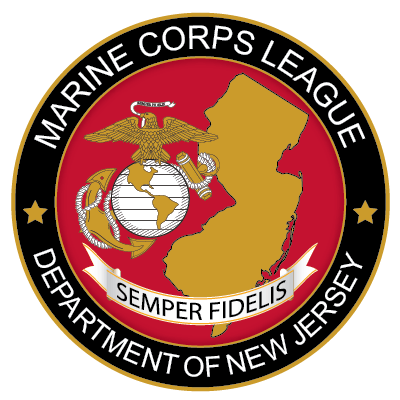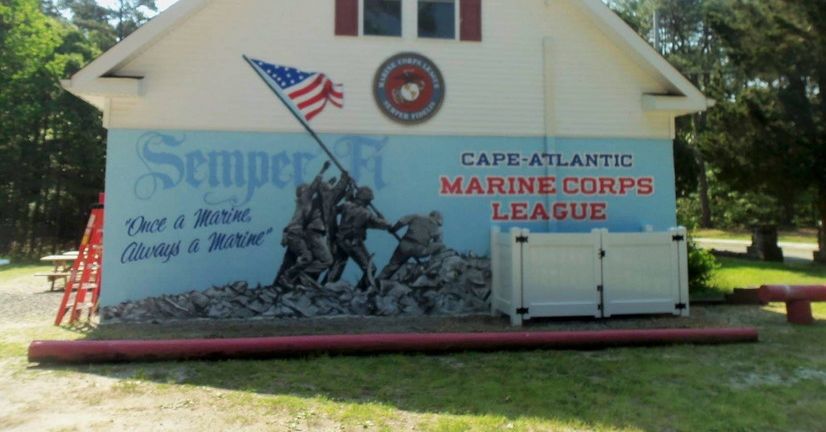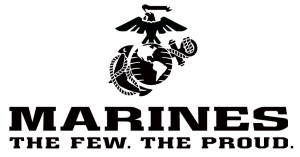The world over, the word Marine defines something more than a soldier. It arouses the image of a warrior on the boundlessness of the oceans, coming from the mystique of the sea onto the land – an amphibian, a soldier of the sea. The aura is of one who is different and of whom more is expected.
To be a United States Marine requires more than mastery of the skills and techniques of soldering or seamanship – the practical abilities that come through training and experience. Being a Marine is a state of mind that comes from a imbedded belief that he or she is, in fact, unique, a cut above. A Marine is, most of all, part of an organization that demands a difference – and delivers excellence beyond others in all it is and does. This is The Corps, the strongest brotherhood in the world.
Among those not in the profession of arms, the notion exists that military service is simply another job alternative; that soldiers go to work with only pay and benefits in mind. Being a Marine has never been just a job, just a paycheck, an occupational specialty, or an insignia of rank. Being a Marine comes from the Eagle, Globe and Anchor that is tattooed indelibly on the innermost being of those privileged to earn the title. It is a searing mark, one that does not fade over time. “There’s no such damned thing as an ex-Marine! Once a Marine, always a Marine!” To dispute this is to invite a brawl.
Few who have borne the title fail to identify with it throughout their entire lives. Former Secretary of State James Baker, long after his active service, was known, on light-hearted occasions, to identify himself as “Secretary of State, and Captain, United States Marine Corps.” Pride and cockiness are marks of a Marine: a belief in self, a confidence in fellow Marines, and an almost emotional belief in the institution. The corps is holy to Marines. Their unabashed pride in the organization breeds selflessness unique in the American culture. As a leathery gunnery sergeant put it to a recruit many decades ago, “Lad, if you must, it’s okay to die for the Corps, but it’s not okay to soil its battle flag on the way down!” This dedication to institution, and to those who comprise it, harkens to the days of loyalty to kings, the loyalty of Napoleon’s Old guard at Waterloo, and to Henry V’s band of brothers at Agincourt. Indeed, “band of bothers” describes those who are the Corps – men and women alike – as it describes no other organization anywhere.
Pride runs deep in Marines. The story is told of an American lady visiting a French field hospital in World War I who noticed among the fiercely whiskered Gallic faces one unlike the others. “Oh,” she said, “Surely you are an American!” No ma’am,” the casualty answered, “I’m a Marine.”
Being a Marine has been likened by some to a calling – an almost religious commitment to the Corps. Among the proud marching song of the five American armed services, only one is titled “hymn” – “The Marines’ Hymn.” Years before it became fashionable among the other services to stand when one’s service song is played, Marines stood to attention for their Hymn on every occasion. Today, as proud members of other services applaud and cheer their song, Marines still stand, almost reverently, at attention for their hymn. Newly commissioned Marine lieutenants, experiencing the tradition of the formal officer’s mess dinner, stand solemnly at its conclusion to sing, from memory and in unison, the verses of the hymn. The pride, commitment, and dedication to the Corps in their eyes and in the strength of their young voices is palpable and moving.
Marines enjoy a reputation for prowess in combat, a reputation earned in battles “in every clime and place” throughout our nation’s history. Yet it has been said that the most important contribution the Marine Corps has made to our nation is not that it has fought and won battles. Rather, its most enduring contribution is that it makes Marines, imbues them with extraordinary mettle, and returns the great majority to civilian life with exceptional qualities of confidence, determination, leadership, and a winning spirit that gives strength to our national character. These “once a Marine, always a Marine” citizens, whatever their successes, never abandon the pride instilled in them for, or their identification with, the Corps.
The process of making a Marine is thought by many to begin with recruit training. Indeed, and unique to the Corps, it begins well before that, as part of the recruiting process. On high school career days, when recruiters appear from each of the armed services to give a presentation of benefits, education opportunities, job selections and pay incentives, Marine recruiters want to speak last. Following the sales pitches, the Marine sergeant stands, looks at the audience, and with almost arrogant disdain, announces: “There may be one or two of you good enough to be Marines. If you think you are, I’ll talk to you!”
Marine recruiting posters do not promise material benefits, but, rather, “Maybe you can be one of us. “ We never promise you a rose garden”: “Nobody likes to fight, but somebody has to know how”; “We’re looking for a few good men and women.” A challenge – not a guarantee – is laid down, and the gauntlet is picked up by young Americans of ordinary fiber seeking to attain the extraordinary aura of the Corps.
Arched over the gate at one of the Corps’ oldest and most legendary bases – Parris Island, South Carolina – is a sign: “Where the Difference Begins.” Through this gate, and others like it in San Diego, California, and Quantico, Virginia, thousands of young Americans pass to accept the challenge to become a Marine. Here, in the intense and impassioned weeks that follow, they will undergo trials of stress and physical endurance beyond those they believed themselves capable. Here, self-discipline and personal responsibility are ingrained. “Yes, sir! No, sir! No excuse, sir!” reflect the Corps’ intolerance of excuse for failure. “I’m sorry, sir” gets thunderous disapproval from the drill instructor: “You’re never sorry for anything you do in the Corps!”
During the weeks in this forge, young bodies harden, maturity emerges, minds focus, confidence grows, brotherhood takes form, and pride begins to tingle. At their conclusion, “recruit” or “candidate” becomes “Marine” in the euphoria of accomplishment. The new Marine knows that he or she has passed through a trial that others have not dared, and has gained acceptance in a stored band of brothers: “The few…the proud…the Marines.”
Marines respect tradition. Their uniforms change little over time. Their buttons are emblazoned with the oldest American military insignia worn in any service. The collar of their ageless blue uniform harkens to the leather stock worn around the necks of their American revolution – era predecessors. Their officers wear the replica of a sword presented by an Arab bey after a Marine victory on “the shores of Tripoli: two centuries ago. They fervently believe the scarlet stripe on their trouser leg is the “blood stripe” earned in ‘the halls of Montezuma.” Their hats are marked by a quatrefoil, symbolic, they have been told, of a white cross used in the days of sail to identify their officers to Marines perched high in the ship’s rigging and clearing the enemy’s deck with musketry.
With these visible manifestations of tradition, Marines cling also to standards that have sustained the Corps over its history and been passed down to them form generations before. The most defining among these is the Marine Corps creed: “every Marine a riflemen.” In a world of fantastic technology, this statement seems antiquated. Yet, generations of Marines learn to know a rifle first, and with it, the fundamentals of infantry – the backbone of combat. Sophisticated specialties come later. Whatever their assignments, all Marines spend time each year polishing their marksmanship with the rifle. Officers, for their first half-year as lieutenants, carry and learn to fight with rifles. Only then are they armed with pistols.
Unique to the Corps, would-be pilots learn first the tactics and techniques of infantry; only afterward are they trained in the intricacies of piloting sophisticated aircraft. As testament to the bedrock of this creed, it is not insignificant that the first Marine officer to receive the Medal of Honor in World War II, Captain Henry T. Elrod, was a pilot, his aircraft no longer flyable, who died leading Marines as infantry on Wake Island. “Every Marine a riflemen.”
Flowing from spirit, tradition, pride, comradeship, and dedication are the fundamental hallmarks of Marines. Courage is foremost among these. As the fledging Corps began to take form in the early years of our nation, Marines wore their motto, “Fortitudine” – “Courage” – on their cap badge. Courage under fire, tenacity, and determination to stand when others would turn are the historic badge of Marines.
Young Lieutenant Clifton B. Cates, destined to become the Corps’ 19th commandant, reported during a World War I battle: “I have only two men left out of my company, and twenty out of other companies…I have no one on my left, and only a few on my right. I will hold.” twenty-five years later, during the desperate fight for a toehold on a Pacific atoll called Tarawa, Colonel David M. Shoup, who would be the 22nd commandant, reported similarly: “casualties many; percent dead not known; we are winning.” And in the frozen snows of the Korean winter, Major General Oliver P. Smith, commanding the 1st Marine Division and surrounded by outnumbering communist Chinese divisions, responded to a reporter’s query: “Retreat hell! We’re just attacking in a different direction!”
“First to fight for right and freedom, and to keep our honor clean, we are proud to claim the title of United States Marine.” So proclaims the first verse of “The Marines’ Hymn.” Courage, honor and faithfulness are held high by Marines, Integrity, ethical behavior, a respect for fellow human beings (even the enemy), devotion to a cause, commitment to an organization, and an unyielding bond of faith with those beside you are principles to be inculcated into and believed by those in whom the nation places its ultimate trust for survival, and its authority to inflict violence on others in its behalf. They are keystone values in the character of those who are Marines. “It’s not okay to soil the battle flag on the way down,” says it. “No Marine leaves another Marine on the battlefield” says it. But “Semper Fidelis” … “Always faithful,” the motto of the Corps since 1883, says it best.
This faithfulness to country and Corps has, over time, brought Marines to an extraordinary relationship with America’s leaders, and its commander-in chief in particular. Our third president, Thomas Jefferson, designated the Marine Band “The President’s Own,” and it has played for the inauguration of every American president since. “Hail to the Chief,” the president’s march, came from the Marine Band. By tradition, the Marine Band can leave Washington to play elsewhere only with the permission of the president. Marines guard presidential ambassadors in embassies throughout the world. A Marine opens the door to the east wing of the White House – the president’s office. Marines guard the presidential retreat at Camp David, Maryland. Marine helicopters lift the president from the lawn of the White House and, wherever he travels – worldwide – are there to meet and transport him. Indeed, the relationship between Marines and the American presidency is special and enduring.
“Send in the Marines” has been the American response to countless crises distant from our shores over the history of our nation. “Expeditionary” is the word that embodies this historic role of Marines – who are created and shaped not for home service, but for overseas expeditions. In 1775, the first American soldiers sent forth from the fledging nation’s shores were a detachment of Marines dispatched to New Providence, Bahamas. That amphibious raid – the first in what remains today a Marine specialty – aimed to seize guns and gunpowder from a British fort. Three decades later, Marines again sortied with the fleet to Derna, Tripoli, to put down Barbary Coast pirates taking a toll of American merchant ships in the Mediterranean. And in the same century, as American engaged in conflict with its neighbor to the south, Marines were first to reach the site of the palace of the Aztec chieftain, Montezuma. By such deeds over their entire existence, Marines lay claim to distinction as America’s premier expeditionary force.
Unlike the emblematic shields of their sister services, signifying defense, the Marine emblem – eagle, globe, and anchor – symbolizes distant service under the American eagle, by land and sea, to represent their nation’s interests “in every clime and place.”
Some have likened Marines to the legionnaires of history. Historian T.E. Fehrenbach, accounting the Korean War of the mid-twentieth century, articulated this expeditionary image of Marines:
“The man who will go where his colors go, without asking, who will fight a phantom foe in jungle and mountain range, without counting, and who will suffer and die in the midst of incredible hardship, without complaint, is still what he has always been, from Imperial Rome to sceptered Britain to democratic America. He is the stuff of which legions are made…He has been called United States Marine.”
Lieutenant General H. Krulak, one of the Corps’ great leaders, poignantly characterized these same remarkable qualities when he wrote:
“Although the Corps contains its share of visible heroes, its triumphs, in an aberration of history, are triumphs of the institution itself and not the attainments of individual Marines. We remember that Marlborough defeated the French, that Togo defeated the Russians, that Sciopio defeated Carthage. But we know only that it was the Marines who won at Belleau Wood, the Marines who won at Guadalcanal, the Marines who led the way at Inchon. And that is exactly the way the Corps’ heroes – big and small – would have it, for the Corps is less of the flesh than of the spirit.”
Indeed, the Marine experience, for all those who have lived it, and for those who will live it, is special and to a higher standard in countless forms of measure. If there is a single distinction that stands out, among the many, marking the experience in the lives of the men and women who are Marines, it is their extraordinary and selfless dedication to and identification with The Corps.
This is the Marine Corps experience.


